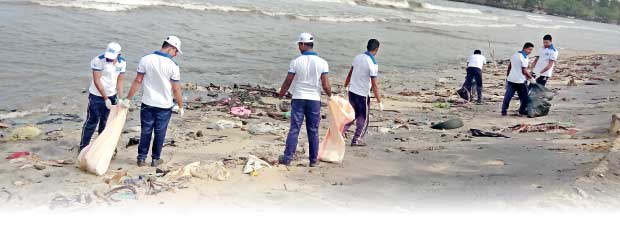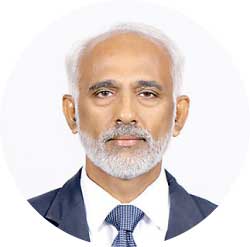Reply To:
Name - Reply Comment
Last Updated : 2024-04-19 07:40:00

 Sri Lanka is embellished with its spanned coastal belt which ranges about 1,640 km. The coastal belt also includes 82 lagoons. Even though we are fortunate to have such an attractive surrounding, the risk of polluting Sri Lanka’s ocean has increased rapidly. This is due to the impact of pollutants. We see these beautiful places being polluted due to the presence of a large amount of non-degradable waste and increasing population.
Sri Lanka is embellished with its spanned coastal belt which ranges about 1,640 km. The coastal belt also includes 82 lagoons. Even though we are fortunate to have such an attractive surrounding, the risk of polluting Sri Lanka’s ocean has increased rapidly. This is due to the impact of pollutants. We see these beautiful places being polluted due to the presence of a large amount of non-degradable waste and increasing population.
Plastic production increasing drastically in the world is providing a serious threat to the marine environment. At the same time, the sea around Sri Lanka is also contaminated due to poisonous chemicals, being released through factories, and the leaking of oil, from vessels. Therefore these pollutants have adversely affected the sea and brings a threat to the lives of species, coral reefs and the people as well.
Marine pollution can be simply defined as releasing of waste in to the sea thereby affecting the quality of the ocean environment. These polluting activities give rise to unhealthy conditions with regard to all organisms including humans. Sea pollution happens in two ways: Sea- based Pollution and Land-based Pollution.
Sea-based Pollution occurs as a result of the sea being contaminated due to oil and fuel leaked from vessels, smoke emitted from ships and the releasing of ballast water. Land-based Pollution happens mainly as a result of fishing activities and the tourism industry. Being an island nation, the ocean plays a vital role in regard to the existence of its people.
Marine Environment Protection Authority (MEPA) General Manager Dr. Terney Pradeep Kumara told Daily Mirror that the sea in general is polluted with 6.4 million tonnes of waste annually. He added that the sea around Sri Lanka was polluted with 1.59mn tones of waste. The common waste items that can be found in the coast of Sri Lanka are grocery bags, plastic bottles, drinking straws, bottle caps, glass bottles, rigifoam and cigarette butts.
“The breakdown of waste products found around Sri Lanka annually amounts to 41% plastic, 34% fishing nets, 4% glass and 14% other effluents. This waste that accumulates is not merely from Sri Lanka, but comes from neighbouring countries like India, Thailand and Indonesia. Therefore, a sustainable solution is needed to control the release of waste to the sea,” Dr. Kumara said.
“If we assume that the waste collected at the sea is 100%, the majority of it, exactly 90%, comes from inside the country. What the coast contributes amounts to exactly 10%. Although 14.6 million people reside in the coastal areas, a large amount of waste is released from the centre of the country,” he added.
The solution to tackle marine debris lies with the people who dump garbage haphazardly in to the sea. Therefore people should be educated at different phases. They must be briefed about matters such as encouraging the reduction of using single use plastics and waste segregation, recycling and beach clean ups.
While solid waste management has been in the spotlight, we can’t ignore marine pollution merely because it’s sometimes out of sight and thus out of mind.
MEPA Chairman Rear Admiral (Rtd) Rohana Perera said that President Maithripala Sirisena had declared the third week of September as the ‘National Coastal and Marine Environment Protection Week’ in keeping with the International Coastal Cleanup Day.
Accordingly, the Marine Environment Protection Authority (MEPA), together with Governmental and non-governmental organisations and the private sector, have planned to launch a series of programmes from September 15 to 22 covering the entire coastal belt of Sri Lanka. This initiative focuses on empowering the fisheries and tourism industries to keep the sea pollution-free.
“The Government and its entities have shown some interest and enthusiasm in looking in to the marine pollution in Sri Lanka and thus initiated programmes to clean the coastal areas which will be followed by consulting programmes involving the people,” Perera said.
Meanwhile, the Department of Coast Conservation and Coastal Resource Management (DCCCRM) Director General Prabhath Chandrakeerthi said during a press briefing that the coastal cleanup programs were launched in the relevant districts covering the entire sea belt.
“Districts programmes will be held at 75 locations in 14 coastal districts during the week. Each of these programmes will comprise an inaugural session, coastal cleanup and a survey on marine debris collected at the sites. We have also invited students, from 288 schools situated along the coastal belt, and people to join us and make this event a success. Officials from the DCCCRM, Civil Defence Department, Sri Lanka Navy and 13 other institutions are expected to participate in this programme,” Chandrakeerthi said.
It’s noteworthy that the conservation of the marine environment depends on how keen we are in disposing garbage at appropriate places. If we are careless in dumping waste, it is we who will suffer in the long run. Therefore, let’s start from the smallest unit which is our home, so as to address maritime pollution.
 The common waste items that can be found in the coast of Sri Lanka are grocery bags, plastic bottles, drinking straws, bottle caps, glass bottles, rigifoam and cigarette butts
The common waste items that can be found in the coast of Sri Lanka are grocery bags, plastic bottles, drinking straws, bottle caps, glass bottles, rigifoam and cigarette butts
Marine Environment Protection Authority (MEPA) General Manager Dr. Terney Pradeep Kumara
 The common waste items that can be found in the coast of Sri Lanka are grocery bags, plastic bottles, drinking straws, bottle caps, glass bottles, rigifoam and cigarette butts
The common waste items that can be found in the coast of Sri Lanka are grocery bags, plastic bottles, drinking straws, bottle caps, glass bottles, rigifoam and cigarette butts
Marine Environment Protection Authority (MEPA) General Manager Dr. Terney Pradeep Kumara
 We have also invited students, from 288 schools situated along the coastal belt, and people to join us and make this event a success
We have also invited students, from 288 schools situated along the coastal belt, and people to join us and make this event a success
(DCCCRM) Director General Prabhath Chandrakeerthi

Add comment
Comments will be edited (grammar, spelling and slang) and authorized at the discretion of Daily Mirror online. The website also has the right not to publish selected comments.
Reply To:
Name - Reply Comment
On March 26, a couple arriving from Thailand was arrested with 88 live animal
According to villagers from Naula-Moragolla out of 105 families 80 can afford
Is the situation in Sri Lanka so grim that locals harbour hope that they coul
A recent post on social media revealed that three purple-faced langurs near t

10 Apr 2024
09 Apr 2024